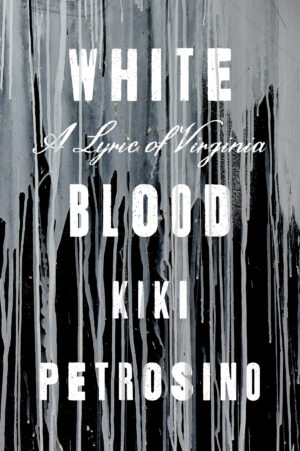White Blood: A Lyric of Virginia
by Kiki Petrosino
reviewed by Katie Berta
Kiki Petrosino’s fourth book, White Blood: A Lyric of Virginia, blends the techniques of documentary poetics, erasure, persona, and traditional lyric to document and personalize the ways that descendants of enslaved people attempt to reconnect with their family histories—only to be thwarted by the persistent effects of racist policy and violence. The collection has a searching, yearning momentum that is cut by the wry intellect of a speaker who knows her pursuit of historical meaning remains subject to the same colonial forces that influenced the lives of her ancestors. Pointedly, the three genealogical poems that punctuate the collection, “What Your Results Mean: Western Africa 28%,” “Northwestern Europe 12%,” and “North and East Africa 5%,” are erasures of Petrosino’s real genealogy test results, highlighting the incompleteness of this way of accessing a genealogical or family history.
The West African you
is a
hunter
the first poem in this series begins. The “you” of the genetics and the “you” of the real speaker have “split//and//expanded,” moving away from each other like the words in these lines. The glaring gaps in such genetic descriptions show the failure of a medicalized report to account for lived experience. Petrosino turns these narratives into something that does account for her lived experience—in this case, that of reading the genealogical test results and sensing their implications—by recontextualizing the words of the report and thus reconstituting their meanings. The erasures account for enslavement:
The West African component of your
lineage. The
“Out of Africa” event
the
New World slave
seen in
this genetic print
Petrosino also uses them to address empire:
region of rope
much more
than a
region
the spread of
This
in small ages
Further, she considers racial and genetic identity through diaspora (“region // migrating from // region”) and historical identification:
north of
the world
the earliest people
saw
Africa
evident in the
I
The complex construction of the speaker’s identity is complicated further by the ways she attempts to access her identity through family history and is thwarted. The book begins with “Prelude,” in which “You’re on a train & your ancestors are in the Quiet Car. // The Quiet Car is locked with a password you can’t decrypt.” Though the “you” pursues them, she is not able catch up with her ancestors, who “lay small explosives” along her path to prevent being caught. At the end of the poem, what was cinematic—a spy movie sequence in which our hero pursues her enemy through jostling train cars—becomes dreamlike: “They leap from carriage to carriage as if weightless, as if drifting, as if curling tongues of snow. / You cling to the side of the train as each of your ancestors lift away from you. / They float into the cloud of themselves.”
Petrosino’s speaker fights a war for information against a past that set traps for those who come searching for that information. In this poem, the ancestor becomes the enemy, defending against the genealogist’s efforts. In others, though, like in the sequence of poems all titled “Message from the Free Smiths of Louisa County,” Petrosino assumes the voices of these ancestors, laying bare their reasons for hiding from posterity. Her ancestors speak directly to her: “You want to know who owned us and where,” says one poem. “You ask why we didn’t register as required [ … ] / why we avoided the courthouse, the census, the bank,” says another. It dawns on us, as it dawned on Petrosino, that part of what complicates her search are the very mechanisms by which her family survived:
While so many perished in other counties
Or raged with Nat in Southampton, how did we manage?
We avoided the courthouse, the census, the bank.Whatever we had, we held. Whatever we knew
we told no one who counted. We kept back
our names. We didn’t register as required. [ … ]Why do you trust the courthouse, the census, the bank?
The last line of this poem sends us back into the present, where things are changed and are still the same. Many poems in the book make clear that institutions, like “the courthouse, the census, the bank,” are still not to be trusted. In the crown of sonnets “Happiness,” that institution is the speaker’s midwestern university, where she experiences racism while mourning her grandfather’s death by suicide. In the section “Albemarle”—which contains some of the strongest, most striking poems in the book—it is Jefferson’s plantation, Monticello, that represents versions of American history that elide the uncomfortable truth that this country’s existence relied on—relies on—the labor of enslaved people. “The Shop at Monticello” succinctly lays out the ways this relationship is still exploitative:
I’m a black body in this Commonwealth, which turned black bodies
into money. Now, I have money to spend on little trinkets to remind meof this fact. I’m a money machine & my body constitutes the common
wealth. I spend & spend in order to support this. I support this mountainwith my black money. Strange mountain in late bloom. Strange mansion
built on mountains of wealth.
Petrosino’s speaker can feel the weight of a racist past and present bearing down on her, a mountain. Still, the commonwealth is dependent on her “black money,” still it depends on her labor and the fruits of it. In this way, though White Blood is rooted in the past—the ways we search it for significance, the ways it evades and escapes us—its complexity and intellect are urgent for the present too. Urgent for understanding the ways we make meaning of people’s lives, their identities, their bodies.
Published on June 2, 2020

